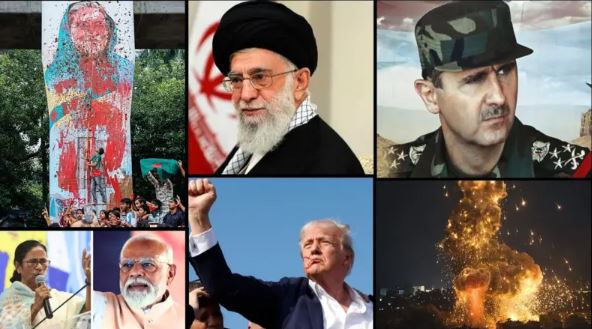2024 has been a year that many will never forget, with a mix of political upheaval, deadly conflicts, and extreme weather events making headlines across the globe.
From Bangladesh to Syria, and Gaza to Russia, the world has been shaken by a wave of violence, power struggles, and unexpected political shifts.
In this year of ‘heat’ and tension, here’s a look at some of the most significant events that captured the world’s attention.
Political Collapse and Escapes
The year began with conflict, and it didn’t stop. Across various regions, wars and violent protests caused widespread fear and destruction.
Thousands lost their lives, and millions were displaced—children and the elderly among them. As political leaders clung to power, many of them were forced to leave their countries in dramatic escapes.
In Bangladesh, unrest in July brought international attention, with internet shutdowns and violent protests making the news worldwide.
Prime Minister Sheikh Hasina, who had been in power for over 15 years, even fled the country on August 5 after the situation escalated.
The political crisis also brought attention to the arrest warrant for a former prime minister and strained relations with neighboring India.
On the global stage, the fall of Syrian President Bashar al-Assad`s government, which had been in power for over two decades, marked the end of an era.
Assad had survived the civil war with the help of Russia and Iran, but by the end of the year, he was forced to flee, marking the collapse of his authoritarian rule.
The fall of Assad’s regime was a major turning point, as it ended one of the longest-standing autocratic governments in the world.
Wars and Attacks Across the Globe
2024 saw many ongoing wars and fresh outbreaks of violence. One of the most devastating conflicts was the war in Gaza, which reached its peak in 2024.
The fighting resulted in more than 45,000 Palestinians being killed, and more than 2 million people were forced to flee their homes.
Tragically, 133 journalists were among the casualties. The war spread to other parts of the Middle East, dragging in countries like Israel, Lebanon, and Iran.
Iran played a significant role in these conflicts, especially in its long-standing shadow war with Israel.
Tensions between the two countries escalated in 2024 with missile attacks, drone strikes, and retaliatory actions.
In January, Iran launched missile strikes on targets in Iraq, Syria, and Pakistan, following an earlier assassination of a top Iranian commander, General Qasem Soleimani.
As the year went on, Iran became more involved in regional conflicts, including the ongoing war in Gaza, where Iran-backed Hezbollah in Lebanon and Hamas in Gaza continued to attack Israel.
In addition to the Middle East, Russia’s war with Ukraine continued, with both sides suffering heavy losses.
Russia managed to capture more Ukrainian land in 2024 than in previous years, despite international support for Ukraine from the West.
High-Profile Deaths Shake the World
Along with the conflicts, 2024 also saw the loss of several key figures who had a significant impact on world politics.
In Bangladesh, the murder of Anwarul Azim, a Member of Parliament from Jhenaidah, shocked the nation. He was killed in Kolkata, India, in May, and the incident created a stir in both Bangladesh and India.
In February, Russian opposition leader Alexei Navalny, who had been imprisoned by the Russian government, died under mysterious circumstances.
While the Russian authorities claimed he died from illness, his supporters and Western governments pointed the finger at the Russian regime for his death.
In the Middle East, the year saw the deaths of several prominent leaders. Some of the most notable deaths include:
· Salah al-Arouri (January): A senior Hamas leader was killed in a drone strike in Beirut, Lebanon. The attack also killed six others, including two high-ranking Hamas commanders.
· Marwan Issa (March): A key Hamas military commander, and one of Israel`s most wanted, was killed in an Israeli airstrike on Gaza.
· Ebrahim Raisi (May): Iranian President Ebrahim Raisi died in a helicopter crash on May 19. He was a close ally of Iran’s Supreme Leader, Ayatollah Ali Khamenei.
· Mohammad Deif (July): The military chief of Hamas was killed in an Israeli airstrike on July 13.
· Ismail Haniyeh (July): The leader of Hamas’s political branch was killed in a rocket attack in Tehran on July 31. He had played a crucial role in negotiating ceasefire talks.
· Fuad Shukr (July): A top commander of Hezbollah was killed in Lebanon, and the attack led to retaliation in Tehran.
· Hassan Nasrallah (September): The leader of Hezbollah, Hassan Nasrallah, was killed in a strike in Lebanon on September 27. He was a well-known figure in Lebanon and the Arab world, often seen as a close ally of Iran.
· Yahya Sinwar (October): The new leader of Hamas was killed in a drone strike in Rafah, Gaza, on October 1. He had been one of the masterminds behind several major Hamas attacks, including the infamous 2013 assault on Israel.
These deaths were part of the ongoing violence and power struggles that defined much of 2024.
A Year of Election Drama
As 2024 began, it was clear this would be a year marked by elections around the world.
More than 60 countries held elections this year, with some making headlines for their dramatic twists and turns.
Among them, Bangladesh`s election grabbed international attention early on.
Despite intense pressure from the United States and debates about its fairness, the election went ahead.
Sheikh Hasina and the Awami League won a fourth consecutive term in power, and countries like India, China, and Russia quickly offered their congratulations.
However, the U.S. and the U.K. expressed concerns, stating that the election didn’t fully meet international standards.
While many expected the United States to take a strong stance, the aftermath of the election didn’t reflect this.
Still, just a few months later, Bangladesh was back in the news for another big reason.
Alongside Bangladesh, other elections that caught the world’s attention included those in Pakistan, India, and the U.S.
In Pakistan, February’s election was particularly dramatic.
Former Prime Minister Imran Khan, already convicted of corruption, was sentenced to 10 years in prison just days before the vote for leaking secret information.
His party, Pakistan Tehreek-e-Insaf (PTI), couldn’t use its signature "cricket bat" symbol in the election, so its candidates ran as independents.
Despite this, PTI still managed to win 93 of the 266 seats, making waves across the country.
Ultimately, Shahbaz Sharif became Prime Minister after a political deal.
In India, Prime Minister Narendra Modi confidently predicted that his party, the Bharatiya Janata Party (BJP), would win more than 400 seats out of the 543 available in the Lok Sabha.
However, his party only won 240 seats, and the opposition alliance, India, outperformed expectations, winning 232 seats.
This marked a return for the Congress Party, and though Modi managed to secure a third term, it was a narrow victory that saw the opposition gain significant ground.
Meanwhile, in the U.S., the presidential race was full of dramatic moments.
In July, Republican candidate Donald Trump was attacked during a rally when a bullet narrowly missed him.
The bloody images from the event made global headlines, with some voters speculating it was all part of a staged act.
On the other side, President Joe Biden, facing both criticism of his age and his handling of the Gaza conflict, announced that he would step down from the race and back Vice President Kamala Harris for the Democratic ticket.
Ultimately, Trump triumphed in the race, beating the Democrats.
The United Kingdom was also part of the election frenzy. Prime Minister Rishi Sunak, unexpectedly calling for early elections in July, surprised many.
The Conservative Party had promised elections by January 2025, but Sunak’s early call set the stage for a surprise.
In the 2024 elections, the Labour Party’s Sir Keir Starmer emerged victorious, marking the end of Conservative rule.
In South Korea, President Yoon Suk-yeol caused controversy by declaring martial law, leading to his impeachment by the parliament and a temporary suspension from office.
The Hottest Year on Record: Extreme Weather Strikes
Natural disasters and extreme weather also dominated the headlines in 2024. This year is officially being recognized as the hottest on record.
Though 2023 was previously seen as the hottest year, 2024 surpassed that, according to the Copernicus Climate Change Service.
The effects of the El Niño weather pattern caused global temperatures to soar from January to September, leaving Europe and Asia sweltering under record-breaking heat.
The heat wave also had a deadly impact on pilgrims traveling to Saudi Arabia for Hajj, with temperatures hitting 51.8 degrees Celsius.
Saudi officials reported that 1,301 pilgrims died this year during the pilgrimage.
In terms of natural disasters, Typhoon Yagi hit several countries in Southeast Asia, including Myanmar, Thailand, Vietnam, and Laos in September, killing over 500 people.
Just around the same time, Hurricane Helen caused major destruction in the U.S., affecting six states and killing more than 100 people.
In Papua New Guinea, a deadly landslide in May claimed the lives of 670 people, according to the United Nations, though local officials feared that as many as 2,000 might have been buried under the rubble.
In October, Spain experienced severe flooding, with more than 200 people losing their lives. Reports suggested that this was the worst flooding in Europe in over a century.
Tragic Air Disasters Close Out the Year
As the year ended, two major air disasters shocked the world. On December 25, an Azerbaijan Airlines plane crashed in Kazakhstan, killing 38 of the 67 people on board.
Then, on December 29, a South Korean Jeju Air flight crashed in South Korea’s Muan International Airport.
The plane was carrying 181 passengers, and only two survivors were rescued, with 179 confirmed dead.
2024 has truly been a year filled with political drama, climate extremes, and heartbreaking disasters, leaving the world with a lot to reflect on as we look ahead to the new year.






-20260220065859.jpeg)
-20260219110716.webp)
-20260219054530.webp)




-20260222063838.webp)







-20260221022942.jpg)
-20260221022827.webp)














